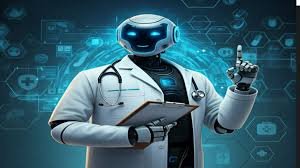In 2025, AI-powered HealthTech solutions are revolutionizing the healthcare sector by improving patient outcomes, streamlining administrative tasks, and making healthcare more personalized and efficient. With AI integrated into diagnostics, treatment plans, and patient care systems, healthcare is experiencing a technological transformation that promises better care at a reduced cost.
AI in Diagnostics: A Leap Forward
Artificial intelligence in diagnostics has been a game-changer in the medical field. In 2025, machine learning models have reached new heights, enabling AI systems to analyze medical images with greater accuracy than ever before. AI-powered tools like IBM’s Watson and Google’s DeepMind can now detect early signs of diseases such as cancer, neurological disorders, and heart conditions with unmatched precision.
Key Advancements in AI Diagnostics:
-
Early Disease Detection: AI tools are identifying diseases at earlier stages, increasing the chances of successful treatment.
-
Accuracy and Speed: AI reduces human error and speeds up diagnostic processes, ensuring quicker intervention.
-
Personalized Health Insights: AI analyzes patient history and genetic data to provide tailored recommendations.
As more AI solutions are integrated into diagnostic workflows, healthcare providers will be able to offer faster and more accurate diagnoses, allowing for timely treatments.
AI and Personalized Treatment Plans
AI’s ability to analyze large sets of health data has led to highly personalized treatment plans. In 2025, AI systems are not just suggesting generic treatments but are also considering a patient’s genetic makeup, lifestyle, and medical history to create custom-tailored care regimens.
The Role of AI in Personalized Medicine:
-
Genomic Data Analysis: AI can quickly process genomic data to identify mutations or genetic predispositions, helping in the design of targeted therapies.
-
Adaptive Treatment Plans: AI algorithms adjust treatment plans based on real-time data, ensuring the plan evolves according to a patient’s response.
-
Chronic Disease Management: AI helps manage long-term conditions like diabetes, by tracking patient data and suggesting lifestyle adjustments or medication changes.
This shift towards personalized care leads to better patient outcomes and improves the overall healthcare experience.
AI for Remote Patient Monitoring
Remote patient monitoring (RPM) is another area where AI is transforming healthcare. With wearable devices and health sensors powered by AI, healthcare providers can monitor patients’ vital signs in real-time, without requiring them to visit clinics.
RPM Powered by AI:
-
Continuous Monitoring: Devices track heart rate, blood pressure, glucose levels, and other health metrics, providing real-time data.
-
Early Alerts: AI algorithms flag abnormal readings, notifying healthcare providers or patients when intervention is needed.
-
Chronic Disease Management: RPM powered by AI enables doctors to adjust treatments on-the-go for chronic conditions such as hypertension and diabetes.
This technology not only enhances patient care but also reduces hospital readmissions by keeping patients in check remotely.
AI in Drug Discovery and Development
AI is accelerating the drug discovery process, which has traditionally been time-consuming and expensive. In 2025, AI-powered platforms are significantly reducing the time it takes to bring new drugs to market.
AI’s Impact on Drug Development:
-
Drug Repurposing: AI can identify existing medications that could be repurposed to treat new diseases, speeding up the development process.
-
Predictive Modeling: AI algorithms can predict how molecules will react within the body, helping researchers focus on the most promising compounds.
-
Clinical Trials Optimization: AI helps identify ideal patient candidates for trials, ensuring better outcomes and more efficient trials.
These advancements make the pharmaceutical industry more agile, allowing for quicker responses to emerging health threats, such as new viruses or antibiotic resistance.
AI and Healthcare Data Management
AI is streamlining healthcare data management by organizing vast amounts of information, making it more accessible, and improving decision-making. Health data has always been fragmented, but AI is bridging this gap.
Key Benefits of AI in Health Data Management:
-
Data Integration: AI systems can integrate data from various sources, including electronic health records (EHRs), medical imaging, and wearables, to create a complete picture of a patient’s health.
-
Natural Language Processing (NLP): AI uses NLP to process and extract meaningful insights from unstructured data, such as doctor’s notes and clinical reports.
-
Predictive Analytics: AI can forecast health trends and disease outbreaks, enabling proactive intervention strategies.
AI-driven data management is not only improving patient care but also streamlining administrative tasks, reducing the burden on healthcare staff.
AI for Healthcare Chatbots and Virtual Assistants
AI-powered virtual assistants and chatbots are becoming essential tools in healthcare. These solutions are assisting patients with scheduling appointments, answering medical queries, and providing initial consultations.
Applications of AI Chatbots in Healthcare:
-
24/7 Patient Assistance: AI chatbots can answer patient queries at any time, improving access to healthcare information.
-
Symptom Checkers: AI-driven symptom checkers offer preliminary assessments, guiding patients to the appropriate healthcare provider.
-
Mental Health Support: AI chatbots are being used to provide emotional support and mental health resources to patients in need.
With advancements in AI, virtual assistants are evolving into a reliable resource for both patients and healthcare professionals.
AI for Improving Operational Efficiency in Healthcare Facilities
AI solutions are being used to optimize hospital operations, from scheduling and patient flow to resource allocation. By automating repetitive tasks, healthcare providers can focus more on patient care.
Operational Efficiency with AI:
-
Smart Scheduling: AI can optimize staff schedules based on patient needs, reducing waiting times and ensuring efficient use of resources.
-
Predictive Maintenance: AI can predict when medical equipment will need maintenance or repair, preventing costly breakdowns.
-
Supply Chain Optimization: AI helps healthcare facilities manage inventories and reduce waste by predicting demand for medical supplies.
As healthcare facilities adopt AI for operational purposes, they can offer better service, increase patient satisfaction, and reduce costs.
AI and Ethics in Healthcare
As AI continues to play a larger role in healthcare, ethical considerations are at the forefront. Ensuring data privacy, preventing algorithmic biases, and maintaining transparency in AI decision-making are crucial.
Ethical AI in Healthcare:
-
Data Privacy: AI solutions must adhere to strict data protection regulations, ensuring patient information remains confidential.
-
Algorithmic Transparency: AI systems must be transparent in their decision-making processes, allowing healthcare providers to understand how conclusions are reached.
-
Bias Mitigation: AI algorithms must be regularly audited to ensure they do not perpetuate biases related to race, gender, or socioeconomic status.
By addressing these concerns, the healthcare industry can ensure that AI continues to provide equitable and effective care.
Conclusion: The Future of AI in Healthcare
The transformative impact of AI-powered HealthTech solutions is undeniable in 2025. From diagnostics and personalized treatments to patient monitoring and drug development, AI is making healthcare more efficient, accessible, and personalized. As AI continues to evolve, it is set to further revolutionize healthcare, making it an exciting field to watch in the coming years. However, ethical considerations and data privacy must remain top priorities as the industry embraces AI’s full potential.
In summary, AI is not just a trend; it’s a fundamental change in how healthcare is delivered. The continuous integration of AI into healthcare practices promises a future where medical care is more proactive, precise, and patient-centered. By embracing these innovative technologies, healthcare providers can meet the needs of modern patients and improve overall outcomes.


